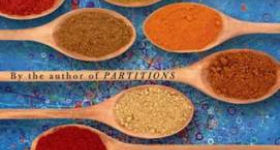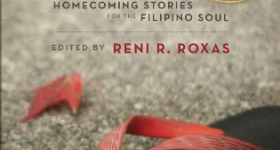"Our Daily Bread" currently playing at San Francisco's CounterPULSE Theater, pushes us towards a gut-level realization: we are what we eat.
"Our Daily Bread," currently playing at San Francisco's CounterPULSE, is luminous. It is an explosive, multi-disciplinary (dance, multi-media, theater, live music, song) whole body exploration about what it means for human beings to eat. A collaborative work between Amara Tabor-Smith of Deep Waters Dance Theater, director Ellen Sebastian Chang, and visual artist Lauren Elder, it asks us to consider eating as not just a physical or social/ethical act (though there is plenty of all this too). Eating in "Our Daily Bread" is an act of soul.
It's an eerie experience, having one's soul called up. As the work progresses, the audience is introduced to a shadowy figure who sings out "What is missing?" He/She (it is unclear) is immediately answered by characters who sing back, "Ham bone?" The shadowy figure returns with, "No, the soul is missing." And we, the viewers, begin to understand that it's not any one ingredient of a meal that is missing, not a lack of food stuff that makes us hungry (at least, not those of us at the theater). It's our way of approaching our food that keeps us wanting more. Following this exchange, we hear a Filipina's poetic narrative about a meal she never had. She eats meals that come out of cellophane wrappers instead of from under her Lolo's hands, she explains. As she finishes her monologue, another figure walks across the front of the stage. She snaps a dish cloth in the air and murmurs to herself, "The soul is missin'."
This careful way of text ("soul") interacting with movement, music, and image is why "Our Daily Bread" succeeded so astoundingly for me last weekend. It seems that with the first introduction of the word "soul," every movement, image, or story was an adding to or traveling way from a felt understanding of having a soul within our food, and how essential that soul is to our nourishment, including that of our planet's. And it seemed I was not alone in this feeling. "This is deep," my neighbor whom I did not know whispered to me. "I know, right?" I muttered back.
Finally, "Bread" also left a ... how to call it? It left a truly visceral impression on me. Meaning, at one point, we watched a video of men running towards bread in a long line. The dancers began a sort of choreographic rendition of the run that echoed, not mimicked, the pace of the men. I watched the dancers' torsos cascade forward over their waists as the weight of their bodies fell into the rhythmic stepping motion, and suddenly I started to feel a resonance of focused hunger in my own body. Those bodies were my body, so I needed to stop the pain. Does that sound too hokey? It was real, alright!
Plus, after speaking with both Director Ellen Sebastian Chang and the show's writer, Aimee Suzara, who is also the above-mentioned poet, I learned that this sensation of one-ness is part of the show's MO. Ellen explained to me that their collaborative process very purposefully included the life narratives of all persons involved. "Like cooking," she said, "We worked with the ingredients before us." And I mention this ... because it's important. Paraphrasing Ellen, it would have been easy for this work to be nostalgic. There are aprons and brooms, set choices that evoke a certain days-gone-by aesthetic. But the show manages to skip that BS. And I think it's at least partially because of the way in which each character's contributions (heritage or otherwise) was collected and truly integrated. The result was the opposite of awkward fusion food. It was just itself. Like when all ingredients become one, yet are still discrete ... like, in a great, big stew?
Whatever. Here's Aimee, breaking it down as she talks about this performance of her personal poetic narrative:
"In my poetry, one thing I'm exploring are the recent tragedies in Japan, Haiti, or New Orleans. People sometimes say, 'Oh it happened over there..' No, it happened to us! If it happened to any of us, it happened to us. In America, we categorize everything. My story is just a “Filipina thing,” not anyone else's thing. And it stays like this until we can experience that story as our own story. We can’t change until we all see it as our own story. We have to get connected. ... So it's unusual for my story, a Filipina story, to get integrated this way. It's so rare we get integrated like that and for the story to be recognized as something that we all need to hear."
So, alright. Let's get connected. "Our Daily Bread" continues for one more weekend, April 22 - 24, at CounterPULSE (SF). Tickets can be purchased here.









Comments